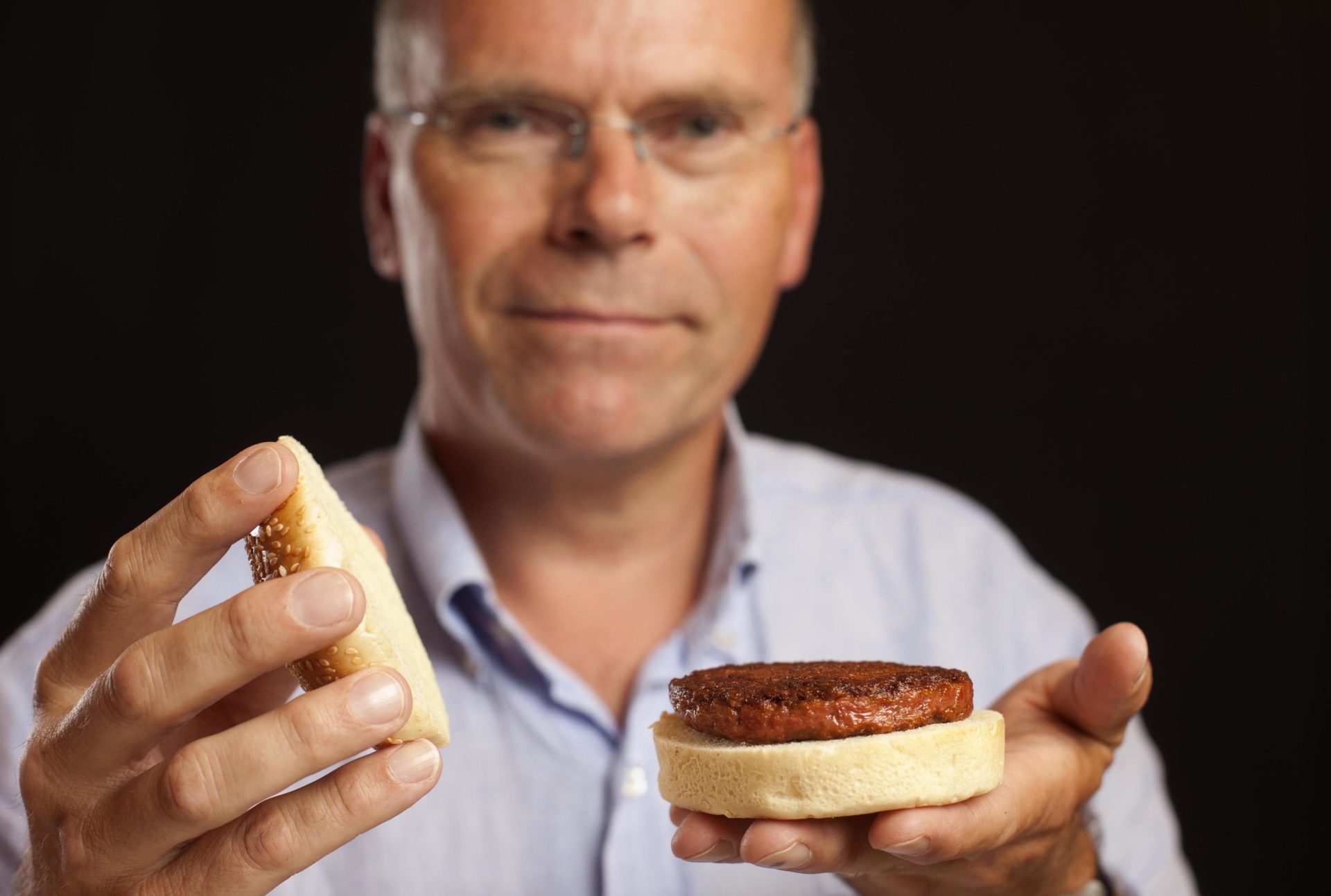
Right now, in advanced laboratories across the world, meat is being grown outside the body of an animal. Petri dishes are packed tight with a stringy red substance that has the look, feel, and maybe even taste of a real burger.
Back in 2013, Professor Mark Post of Maastricht University introduced what he called “the world’s first slaughter-free burger” at a press conference in London.
The meat, which cost almost $280,000 to produce, started with stem cells taken using a small biopsy from the muscle of a cow. Next, says Post, “a medium containing nutrients and naturally-occurring growth factors, are allowed to proliferate just as they would inside an animal.”
The public taste test, which aired on BBC, featured neatly-dressed food critics chewing on the lab-grown flesh and attempting to reason with what they had just consumed.
“The texture, the mouth feel, has a feel like meat,” food writer Josh Schonwald said. “The absence here is the fat.”
A reporter in the crowd asked Post how his product would overcome the “yuck factor” with the general public. He replied that marketing wasn’t his strong suit, but he understood the distrust with “any lab or factory-made product.”
It wasn’t long ago that this idea would belong in a sci-fi film. For those of us who hunt, eat what we kill, and enjoy the entire process, this Orwellian future is pretty hard to fathom, yuck factor or not.

Is This Actually Happening?
By some accounts, 2019 was a banner year for cultured meat (or whatever we end up calling it). It is gaining momentum through advancements in production, innovations in technology, and millions of dollars in new funding.
Back in August, five American companies came together to found the Alliance for Meat, Poultry and Seafood Innovation (AMPS Innovation), a lobbying group that describes itself as “a coalition of food companies dedicated to producing meat, poultry, seafood directly from animal cells.”
What was a far-fetched idea only a decade ago has now matured into an industry with the financial and political clout to influence policymakers and regulators.
Although very few outside of the manufacturers of the meat itself have actually tasted the product, some of the biggest names (and venture capital firms) in tech are investing in the trend, including Google co-founder Sergey Brin and even Bill Gates.
According to start-up incubator The Good Food Institute, $155.3 million has been invested since the field emerged as a commercial industry in 2015.
“We are on the cusp of the deepest, fastest, most consequential disruption in food and agricultural production since the first domestication of plants and animals ten thousand years ago,” says London-based think tank RethinkX.
RethinkX is an independent group that intends to “forecast the speed and scale of technology-driven disruption and its implications across society.” They claim that their findings are impartial and data driven. Here’s what else they had to say in their recent report “Rethinking Food and Agriculture:”
“The current industrialized, animal-agriculture system will be replaced with a Food-as-Software model, where foods are engineered by scientists at a molecular level and uploaded to databases that can be accessed by food designers anywhere in the world. This will result in a far more distributed, localized, stable, and resilient food-production system.”
This report details how these new-age food engineers will use molecular cookbooks to design products “in the same way that software developers design apps.”
RethinkX’s report also theorizes that by 2030, demand for cow products will have fallen by 70% and that chicken, pig, and fish markets will follow a similar path. To move that quickly, these new meats are going to have to take hold in short order.
JUST, a San Francisco-based cultured meat outfit, is claiming their lab-grown chicken nuggets may be released this year for close to $50 each. Similar to all of their industry counterparts, they have to overcome those high costs, scale-up issues, and regulatory hurdles to get this done. But if JUST maintains the current pace, it may soon make it over those barriers.
Post now runs a startup called Mosa Meats, which plans to have product on shelves in the next 3 to 4 years. More importantly, they claim that a single cell sample can create around 22,000 pounds of meat. If they’re right, cultured meats would be more efficient, using less land and water.
All of these claims back up the prophecy that this new product is a solution to the currently unsustainable meat industry which will soon be unable to feed our growing population.

What’s at Stake?
This prophecy might very well be true, but there’s a deeper issue at play. If we are thrust into an age where we employ technology to totally erase the impact our food has on the world, how will that impact our humanity?
If we are able to produce the perfect cellular steak, it will all but ensure that our relationship with meat will completely change. It’s this relationship that gives us the tragic knowledge to understand death and balance in the natural world. Even though we’ve long since disconnected from our food on a mass scale, at least the other solutions to our production woes include the reality that life eats life. We can hunt, farm, and grow better in order to feed the estimated 10 billion people we’ll have by 2050, but if adopted on a mass scale, lab-grown meat is a strangely robotic end game for the 2 million year long evolution of consumption for our species.
There’s nothing wrong with exploring new technologies and alternatives to our current eating habits, but these manufacturers seem hell-bent on saving the world through wholesale, if not reckless, change. These products are idealogical as much as they are nutritional, and that is inherently dangerous. It’s a solution that’s all-too comfortable with changing who we are, being pushed by those that follow the religion of innovation and progress.
The good news is that, while it might not be able to scale enough to save the world, taking up hunting is the perfect personal medicine for all of these animal agriculture and meat production ills. Frankly, it’s the antithesis of cultured meats.






